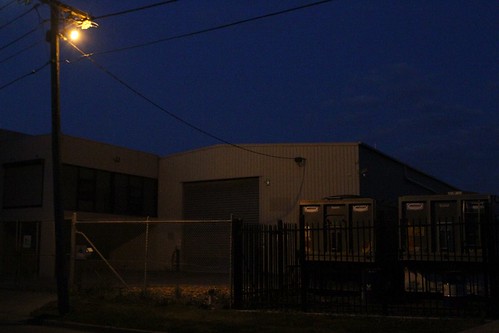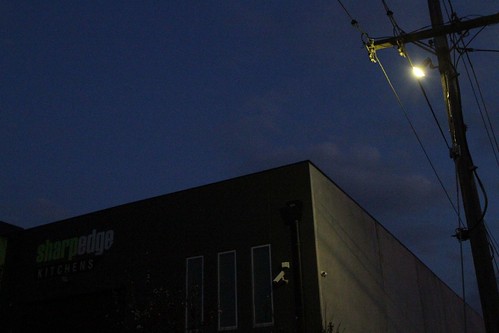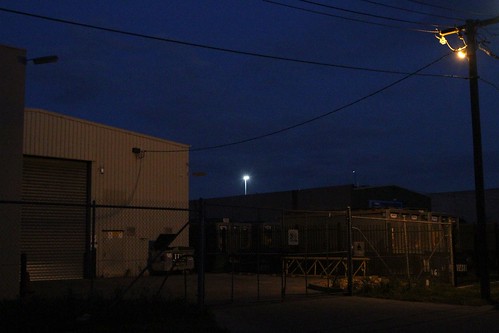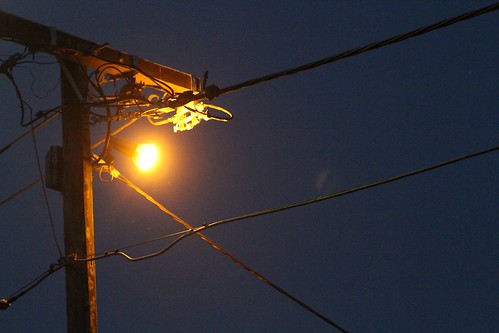Something odd I’ve noticed over the years is floodlights shining onto private property from public power poles. So who foots the bill for them?
They’re a common sight in industrial areas.
Their orange glow shining onto locked up warehouses.
From atop power poles.
But with no power meter to be found anywhere.
And an answer
Well, I finally found the backstory to these lights in the State Electricity Commission of Victoria’s 1989 annual report, under their list of electricity tariffs – it was a fixed service charge.
Security Lighting (Watchman Floodlighting)
Generally available to all customers, except private domestic premises, for all night security floodlighting of buildings, property, etc.
Initial charge per lamp
$150.50Charge per month according to Lamp type/size as follows:
125W mercury
$8.75250W mercury
$15.05400W mercury
$21.30150W sodium
$15.00250W sodium
$18.00400W sodium
$22.05*Initial charge covers the provision, erection and eventual removal of the lamp.
The difference between sodium vapour and mercury vapour lamps is the colour temperature – yellow versus blue.
And that led me to Ergon Energy in Queensland, also uses the ‘Watchman’ lighting brand.
Watchman lights are different to street lights. Street lights are used to illuminate public thoroughfares such as streets and roads. Watchman lights can be used for security or safety to illuminate areas such as public parks, private car parks, and pathways.
Watchman lights are installed and maintained by us. We will be able to advise you on the type and size of watchman light you might need once we receive your connection enquiry or application.
Watchman lights are usually connected to our network via an unmetered supply (UMS) connection, meaning it doesn’t need an electricity meter. This is because the electricity usage is predictable or can be accurately calculated without a meter.
And despite the privatisation of Victoria’s electricity network, the ‘Watchman Floodlighting’ name is still used today by Powercor.
Agreement for the Installation of (Watchman) Security Floodlighting
An Installation Charge will be payable for each light prior to installation. This installation charge applies to
each light and excludes ongoing charges applied by the electricity Host Retailer.LED medium output
$ 2,597.10LED high output
$ 3,115.20
That’s some massive cost inflation!
So who foots the power bill?
Officially, these lights are considered a “franchise unmetered load“:
electrical installations that are connected to the distribution network without an energy meter and must purchase the energy through the respective local retailers. Examples include bus shelter lights, public phone booths, traffic lights and some public electric barbecues.
Or an “unmetered supply“:
The power supply to lighting is not metered. Instead, distributors bill Council with an estimated average of energy consumption per light multiplied by total number of lights and hours of usage. The estimated average is a scientifically determined standard for each light type, agreed to by the regulator and published in ‘load tables’
So the beneficiary of the watchman lighting has to pay a monthly charge, but can’t choose their energy retailer.
In most cases, you can’t switch retailers with an unmetered supply.
Most unmetered supplies (UMS) are linked to a specific retailer based on location and the distribution patch you’re in. There are some exceptions, for some devices. You’ll need to ask your retailer about your particular UMS device.
But there is an incentive to audit these lamps, as sodium vapour and mercury vapour fixtures are costly to run. In 2020 the City of Merri-bek audited the ‘watchman’ lights paid for by Council, upgrading some lights while removing those no longer needed, achieving estimated savings of $30,000 a year and 100 tonnes of carbon emissions.
Further reading
The ‘Flood Lighting’ section of the Queensland Public Lighting Construction Manual has examples of ‘watchman’ floodlight installs.





I believe tram and electric train operators are also charged a fixed fee per month. In government days the tram network paid a symbolic $200 per month.
A former plant nursery near home had mercury vapour ones fitted on three poles back in the SEC days in the 1980s, which later gave up several lots on the corner for housing before closing altogether and replaced with a nursing home on the remainder of the site. The remnants of the former use are the lower brick fence … and one of the security lights atop one of the poles still there.
https://www.google.com/maps/@-37.9540422,145.1964702,3a,53.4y,169.24h,102.75t/data=!3m6!1e1!3m4!1s47BVnT3F8BzDetNm-L3bcA!2e0!7i16384!8i8192?authuser=0&entry=ttu
Later on in the 1990s the local council sought to deal with antisocial behaviour by providing a pair of yellow sodium lights in the nearby park from both sides. Once the problems ended so did the maintenance of lighting.
https://www.google.com/maps/@-37.9445088,145.1980551,3a,60.2y,130.3h,103.7t/data=!3m6!1e1!3m4!1sdBbql0oC7MUJp24yiQEExw!2e0!7i13312!8i6656?authuser=0&entry=ttu
Another form of lighting I saw in broadway and Edwardes St, reservoir and a few other parts of Melbourne was shop front lighting that was not powered from the shop itself but a separate, unmetered supply on the power pole. These strings of lights under the shop awnings were connected to a timeswitch or streetlight “switchwire” relay in a pole mounted fuse box.
Another unusual sight in reservoir are two pole mounted incandecesnt spotlights, I assume they once illuminated steam locomotive in the park. https://www.google.com.au/maps/place/1+Griffiths+St,+Reservoir+VIC+3073/@-37.7149379,144.9955058,3a,75y,352.59h,90t/data=!3m4!1e1!3m2!1sr48B17OKW5919s6CHTsQFQ!2e0!4m6!3m5!1s0x6ad6450d95388453:0xcddffa8f49c111e3!8m2!3d-37.7148274!4d144.9955004!16s%2Fg%2F11g6187hkn